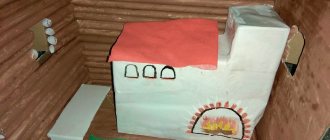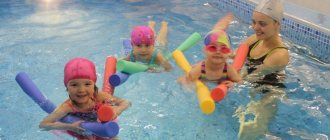Preschool education (essence, structure, content) presentation for a lesson on the topic
Slide 1
Preschool education (essence, structure, content) Lyudmila Stanislavovna Morozova Teacher, MBDOU No. 400
Slide 2
Preschool age is the most important period of personality development; the child’s responsibility and ability to make free choice, respect and understand other people are formed, regardless of their social origin.
Slide 3
Preschool childhood is the first stage of the lifelong education system, the initial stage of mastering cultural and historical values.
Slide 4
The purpose of preschool education at the present stage is not only to form a certain amount of knowledge, but also to develop the basic abilities of the individual, his social and cultural skills, and a healthy lifestyle.
Slide 5
A preschool institution today is considered as a socio-educational system that can solve the problems of creating conditions for the full development of the personality of each child, cooperation of different ages, social and pedagogical work with families, medical education, and the provision of psychological assistance.
Slide 6
The essence of preschool education is its content. The content of education is the priority area on which the development of a person who is capable of independently and consciously building his life in the spirit of universal human values, taking into account the traditions of his people, depends.
Slide 7
In the conditions of modernization and development of preschool education, changes have occurred both in the organization and in the content of the activities of the teaching staff: the educational space implies variability.
Slide 8
The content of preschool education is understood as a pedagogically adapted system of knowledge, a creative way of mastering it and the emotional, value-based, subjective attitude of the child to the world around him, nature, people, society, in general and himself.
Slide 9
The content of preschool education is determined by: the Federal State Educational Standard for Preschool Education (FSES DO). General educational programs of preschool education (comprehensive, correctional and partial. A system of additional education. The level and quality of educational services provided. The formation of a healthy lifestyle. A system of working with society.
Slide 10
The content of preschool education includes: Formation of the foundations of social adaptation and life competence of the child. Fostering elements of a scientific worldview, developing a positive attitude towards the environment. Affirmation of a positive emotional-value attitude towards the practical and spiritual activities of a person. Development of the need to realize one’s own creative abilities.
Slide 11
Preschool education within the basic component is carried out according to the State basic program and teaching aids. Preschool education for children who need developmental correction is carried out according to separate programs and methods developed on the basis of the State Basic Program. Additional educational services that are not defined by the basic component of preschool education are introduced with the consent of parents (legal representatives) within the child’s maximum permissible load.
Slide 12
Principles of preschool education: Full-fledged experience by the child of all stages of childhood (infancy, early and preschool age), enrichment (amplification) of child development. Construction of educational activities based on the individual characteristics of each child, in which the child himself becomes active in choosing the content of his education, becomes the subject of education. Assistance and cooperation of children and adults, recognition of the child as a full participant (subject) of educational relations.
Slide 13
Principles of preschool education: Supporting children's initiative in various activities. Cooperation of the Organization with the family. Introducing children to socio-cultural norms, traditions of the family, society and state. Formation of cognitive interests and cognitive actions of the child in various types of activities. Age adequacy of preschool education Taking into account the ethnocultural situation of children's development.
Slide 14
Targets for preschool education represent social and normative age characteristics of a child’s possible achievements at the stage of completing preschool education. They act as the basis for the continuity of preschool and primary general education.
Slide 15
Goals: Increasing the social status of preschool education. The state ensures equal opportunities for every child to receive quality preschool education. Ensuring state guarantees of the level and quality of preschool education based on the unity of mandatory requirements for the conditions for the implementation of educational programs of preschool education, their structure and the results of their development. Preserving the unity of the educational space of the Russian Federation regarding the level of preschool education.
Slide 16
Target guidelines involve the formation of prerequisites for educational activities in preschool children at the stage of completion of preschool education
Slide 17
The main general educational program of preschool education is a specific model of the educational process of the institution and covers all types of children’s activities, taking into account their priority in each age period and is subject to constant adjustment based on annual monitoring of the quality of educational services provided.
Slide 18
The programs used by the preschool institution provide an optimal load on the child; they comply with the Law of the Russian Federation “On Education” and the Model Regulations on a Preschool Educational Institution, Federal State Educational Standard for Education. Preschool education programs belong to general education programs of preschool education and most of them are continuous with school ones.
Slide 19
To satisfy the requests of parents for the development, training and education of a child, the quality of preschool education is improved: In preschool educational institutions, the quality of education is constantly monitored and the priorities for the development of the institution are outlined. The programs and technologies used in the system are listed. Teachers have their own developments, experiments are being conducted to test them and implement them in work with children.
Slide 20
The maximum permissible volume of educational load must comply with the sanitary and epidemiological rules and regulations SanPin 2.4.1.3049-13 “Sanitary and epidemiological requirements for the design, content and organization of the operating mode of preschool educational organizations”
Slide 21
In the conditions of modernization and development of preschool education, the need arose to develop a general education program for a preschool institution, reflecting the structure of the educational process.
Slide 22
The development of the personality, motivation and abilities of children in various types of activities should cover the following structural units, representing certain areas of development and education of children: Social and communicative development. Cognitive development. Speech development. Artistic and aesthetic development. Physical development.
Slide 23
Aspects of the educational environment for a preschool child should reflect the following: Subject-spatial developmental educational environment. The nature of interaction with adults. The nature of interaction with other children. The child’s system of relationships to the world, other people, and himself.
Slide 24
Planning the joint work of the administration, teachers, representatives of the Founder, parents and the public guarantees the institution the transparency of its activities and the possibility of joint cooperation to create optimal conditions and forms of organizing the educational process.
Slide 25
The essence, content, and structure of preschool education are unthinkable without relying on existing traditions and mastering radically new forms.



